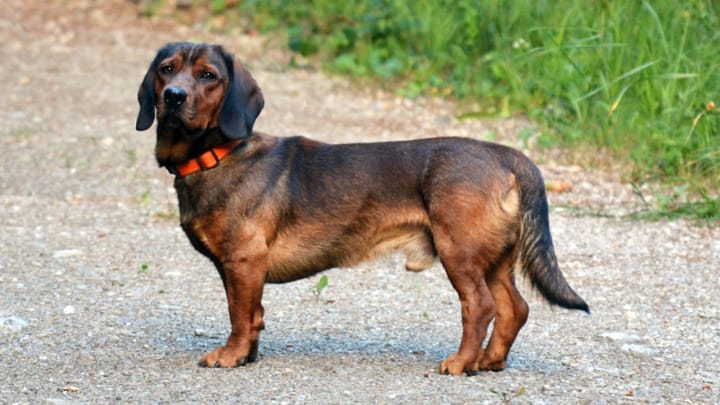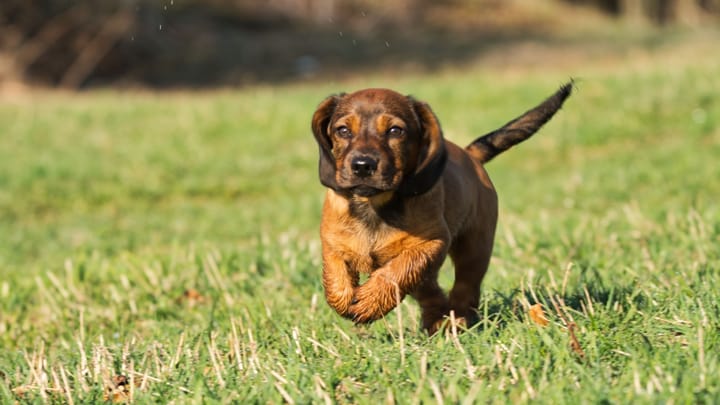Alpine Dachsbracke
Other name: Alpenländische Dachsbracke


The Alpine Dachsbracke is a rare breed of dog that was first bred in the 1880s to assist Austrian aristocrats on alpine hunts. The Alpine proved a useful companion not only due to its size but also its exceptional ability to track scent. Its quarry was (and still is) deer, boar, hare and fox.
|
Life expectancy |
The Alpine Dachsbracke has a life expectancy of between 11 and 13 years |
|
Temperament |
|
|
Size |
Medium
|
|
Adult size |
Female
Between 14 and 15 in
Male
Between 15 and 15 in
|
|
Adult weight |
Female
Between 33 and 40 lb
Male
Between 33 and 40 lb
|
|
Coat colour
Usually this dog is seen of dark red and black. |
Black Red Brown |
|
Type of coat
Thick and dense The double coat consists of a thick topcoat and dense undercoat. |
Short |
|
Eye colour
Dark brown |
Brown
|
If given the opportunity to do so, the Alpine Dachsbracke will adopt a sedentary lifestyle. Its doing so may suit those who do not have the time or will to take their dog for walks. However, this dog will quickly gain weight if not exercised.
More details about the Alpine Dachsbracke
Alpine Dachsbracke: Origins and history
It was during the reign of Emperor Francis Joseph I (1848 – 1916) that the Alpine came into being. Rumour has it that the emperor’s son Crown Prince Rudolf ordered his gamekeepers to come up with a dog that was nimble, resilient and tenacious, and small enough to follow small game into burrows. It wasn’t until 1932 that the breed became officially recognised and was categorised as a scent hound.
Physical characteristics of the Alpine Dachsbracke
A robust and sturdy dog is the Alpine. It is a short-legged dog of dignified stature. Its tail is thick, set high and carried pointing towards the ground. Its ears are also set high and are broad and rounded. The Alpine’s jaw is strong and square; its overall appearance expresses intelligence.
FCI classification of the Alpine Dachsbracke
-
Group 6 - Scent hounds and related breeds
-
Section 2 : Leash (scent) Hounds
Alpine Dachsbracke: Characteristics
Alpine Dachsbracke: Behaviour
Training a Alpine Dachsbracke
To train the Alpine requires the owner to deliver consistent and confident learning. This is a dog that will attempt to lead lessons whenever it can.
Alpine Dachsbracke: Lifestyle
Breed compatibility Alpine Dachsbracke
Alpine Dachsbracke: Purchase price
We do not have enough data to set an average price for an Alpine Dachsbracke. You’re also looking at between £80 to £110 per month to care for this dog.
Alpine Dachsbracke: Shedding
Average
The Alpine sheds moderately.
Alpine Dachsbracke: Grooming
This dog requires little grooming. Brushing regularly (two or three times a week) with a bristle brush will remove dirt and lint from the dog’s coat. Bath this dog only once a month or when absolutely necessary.
Alpine Dachsbracke: Health
11 to 13 years
This is a strong, active and energetic dog. The Alpine is happiest when outdoors and following a scent.
The Alpine Dachsbracke is not especially tolerant of hot temperatures. This dog is prone to heatstroke.
The Alpine is weather resistant and will adapt to cold and wet climes. It is a popular choice of dog for the alpine hunter.
He is an active dog who is not overweight, if his meals are balanced and his needs met.
No hereditary pathology is recognised for this breed. His dangling ears must, however, be given special attention.





